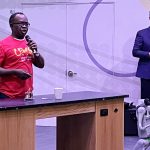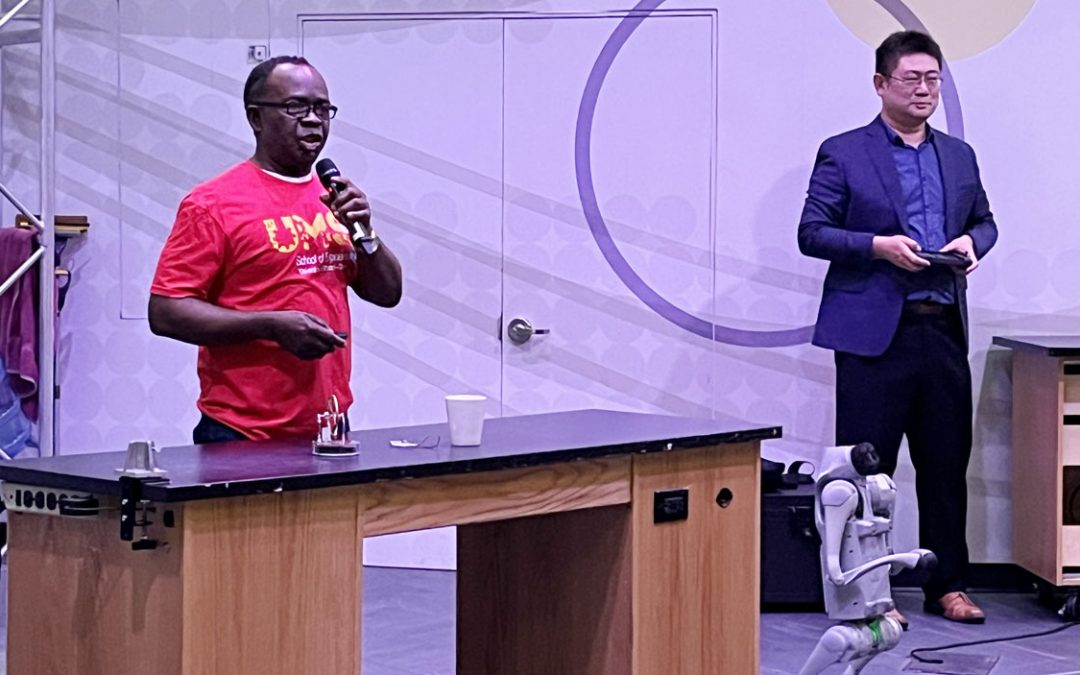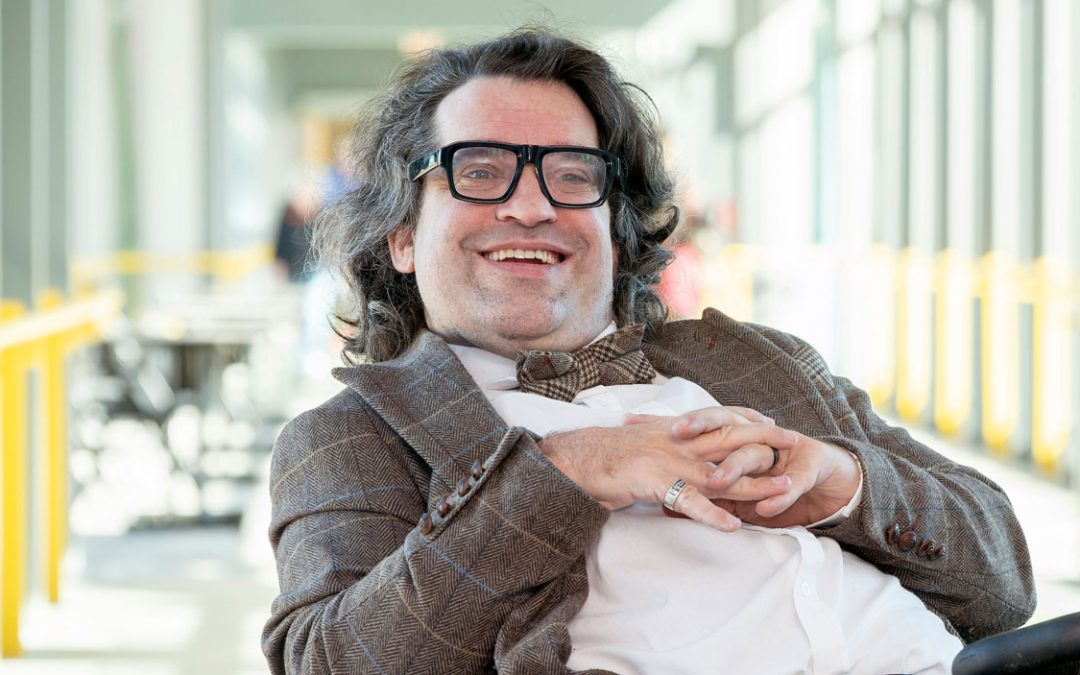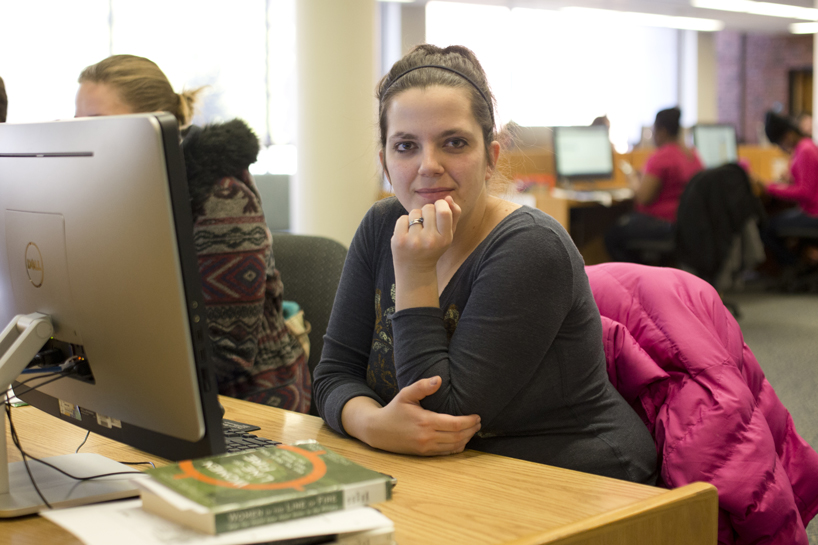
Several years ago, Courtney Williams, 27, was an Army paratrooper/medic in Afghanistan treating soldiers, contractors and locals, especially women. This spring she graduates from UMSL with a degree in psychology and is heading off to graduate school with plans to work with women soldiers suffering from post-traumatic stress disorder. (Photo by August Jennewein)
A few years ago you could find Senior Airman Josiah Hartline sitting at the open door of a Pave Hawk helicopter with his arms wrapped around a .50-caliber machine gun. As gunner on a U.S. Air Force combat search and rescue mission, he provided cover for medics as they evacuated casualties from the ground in Afghanistan.
In the same country at around the same time, you might have met Sgt. Courtney Williams. She was an Army paratrooper/medic traveling to villages to treat soldiers, contractors and locals, especially women.
Today, Hartline, 25, and Williams, 27, are among nearly 400 student veterans at the University of Missouri–St. Louis, the highest percentage of vets among the four University of Missouri System campuses. Thanks to a beefed-up new GI Bill, these young men and women are challenging higher education in growing numbers.
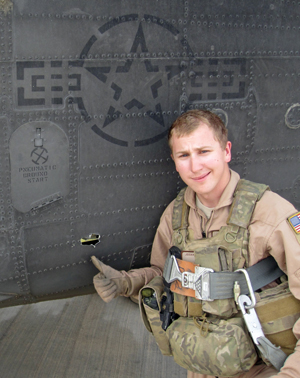
Senior Airman Josiah Hartline points out a bullet hole on his helicopter while he was deployed as a gunner in Afghanistan several years ago. Today, Hartline is one of nearly 400 student veterans at UMSL, the highest percentage of veterans among the four University of Missouri campuses.
“When I first showed up at UMSL, I was confused,” Hartline says. “I was having a hard time just getting enrolled. Someone suggested I go to the Veterans Center. The vets working here can help you with Veterans Affairs or help you find answers at UMSL.”
UMSL opened the popular Veterans Center in December 2012, overseen by James Craig, a retired U.S. Army lieutenant colonel, former commander of the Gateway ROTC Battalion and chair of UMSL’s new Department of Military and Veterans Studies. Student veterans staff the center.
The transition from the intensity of military life to civilian life can be overwhelming.
Veterans are more likely to stay in college if they can connect with others, studies show. The center, with its never-empty coffee pot, comfortable chairs and tables, provides a home base to gather socially or to study.
Veterans are generally mature, goal-oriented, mission-driven and experienced leaders. They may have a spouse and young children, and they usually know what they want.
“Veterans want more bang for their buck,” Craig says. “They’re looking for a large university with programs that transfer training into credit. They want to be in large urban centers, close to VA facilities and jobs for their spouses.”
Hartline is married and his wife works in a St. Louis veterinarian’s office. He’s coupled an ROTC scholarship with his GI Bill and studies military science along with his major in political science. He’s leading younger ROTC cadets now and plans to graduate in 2015.
“I served four years and loved what I did,” Hartline says. “I had the coolest job in the Air Force. Now, I’m looking forward to becoming an officer. And recently I was notified I’ll start flight training when I graduate. UMSL has helped me do that.”
Williams and her husband, Seth, also a UMSL student veteran, have two daughters, 3 and 2 years old. As one of those mission-driven soldiers the military touts, Williams earned an associate’s degree while she was in the Army, even taking online classes while in combat. Nearly all her credits transferred to UMSL.
With two toddlers and a job at a women’s shelter, Williams hasn’t gotten to know many other veterans. But she has high praise for UMSL’s officials.
“The return to civilian life and college all seemed overwhelming at first, but people here were so nice,” says Williams, who will graduate in May with a bachelor’s degree in psychology. “It was very easy working with UMSL.”
Williams’ interest in women soldiers suffering from post-traumatic stress disorder will take her to graduate school and a career in counseling or social work.
She is the kind of student Craig is looking for in military and veterans studies.
“We’re developing courses for veterans and non-veterans interested in professions that specialize in veterans issues,” says Craig. “The other part of my job is to educate faculty and administrators about the military experience. I’m working on translating military education and training into academic credits. The College of Arts and Sciences, the faculty senate and the registrar’s office are all working together. We’re getting there.”
The College of Arts and Sciences Dean Ron Yasbin is excited about the new department.
“The veterans initiative is a moral obligation on our part, but it’s also helping us recruit new students,” Yasbin says. “This new department sits in arts and sciences, but it functions across the university. The Veterans Center has a strong connection to student life. Given what we’ve been doing and the talent we have, I see us becoming a national model in two to three years.”
Contact the UMSL Veterans Center at 314-516-5705 or veteransOffice@umsl.edu.
This story was originally published in the spring 2014 issue of UMSL Magazine.



